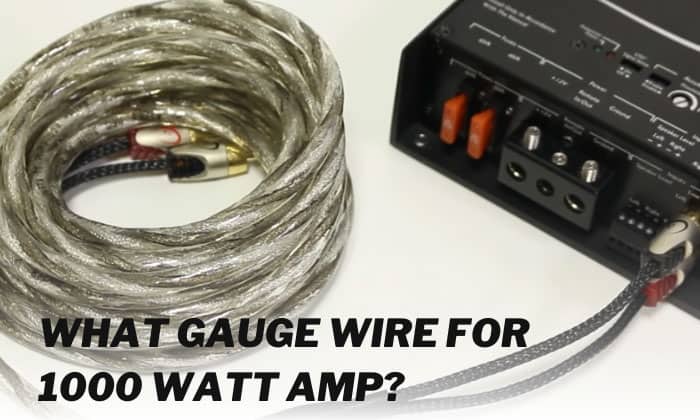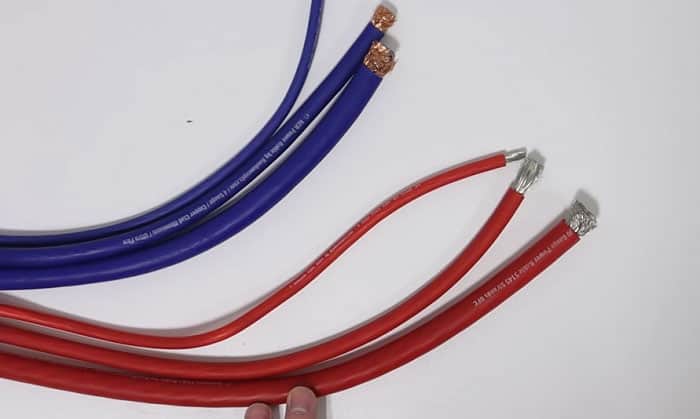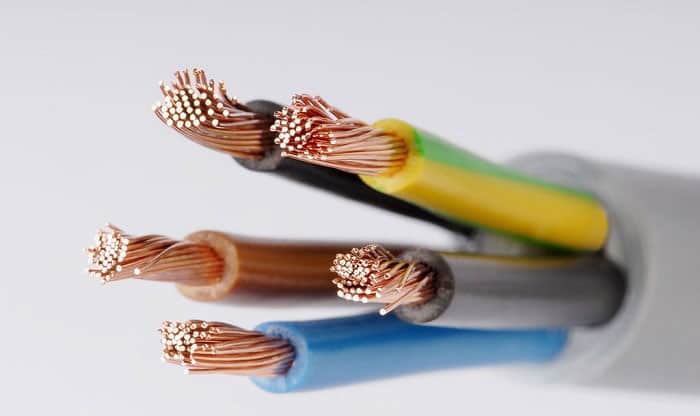Are you installing your audio system? If you’re like me, you’ve probably wondered what gauge wire for 1000 watt amp is best.
A 4-gauge size should suffice to power a 1000-watt amp. But the correct cable to use often depends on different factors, including the amplifier’s class and the required length of the connection.
So, continue reading to find the correct wire gauge for a 1,000-watt amp.
Table of Contents
What Gauge Wire Does a 1000-watt Amplifier Use?
Finding the correct gauge speaker wire to use for a 1,000-watt amplifier requires an understanding of the different values related to that. These include the amperage of the device and how long the wire needs to be. We’ll discuss each factor one by one.
1. Calculator For Wire Gauge
Amplifiers generally fall under two product classifications: classes AB and D. Each class uses different values for the formula 1000 watt amp calculation. These formulas are:
- Class AB: (Total wattage / 65%) / 13.8 volts
- Class D: (Total wattage / 90 %) / 13.8 volts
The answer you’ll get from using those formulas should show you the amperage rating of your amplifier. Next, consider the wire length.
2. Wire Gauge Chart For Amplifier
Generally, you’ll see a 6-gauge reduction per twice the wire’s diameter. Check out the following chart to choose the correct gauge wire for amp.
For example, if you’re going to use a class D amp with an 80-amp rating, you’d need to use a 4 gauge wire if the cord’s length is about 10 to 13 feet. Bear in mind that the amp power wire size often increases as the connection’s length goes up.
In other words, if you need to run the wire at 150 feet, the gauge wire to use would be bigger than what you’d need for a 10-foot setup for 1000w amp. However, you’d normally won’t have to use a 100-foot wire, particularly for amplifiers in vehicles.
| Amperes | Wire Length In Feet | |||||
| 0 to 4 feet | 4 to 7 feet | 7 to 10 feet | 10 to 13 feet | 13 to 16 feet | 16 to 19 feet | |
| 250 to 300 | 4 gauge | 2 gauge | 2 gauge | 1/0 gauge | 1/0 gauge | 1/0 gauge |
| 200 to 250 | 4 gauge | 4 gauge | 2 gauge | 2 gauge | 1/0 gauge | 1/0 gauge |
| 150 to 200 | 6 or 4 gauge | 4 gauge | 4 gauge | 2 gauge | 2 gauge | 1/0 gauge |
| 125 to 150 | 8 gauge | 6 or 4 gauge | 4 gauge | 4 gauge | 2 gauge | 2 gauge |
| 105 to 125 | 8 gauge | 8 gauge | 6 or 4 gauge | 4 gauge | 4 gauge | 4 gauge |
| 85 to 105 | 8 gauge | 8 gauge | 6 or 4 gauge | 4 gauge | 4 gauge | 4 gauge |
| 65 to 85 | 10 gauge | 8 gauge | 8 gauge | 6 or 4 gauge | 4 gauge | 4 gauge |
| 50 to 65 | 10 gauge | 10 gauge | 8 gauge | 8 gauge | 6 or 4 gauge | 6 or 4 gauge |
Related post:
FAQs
What Gauge Power Wire Do I Need For 30 amps at 200 Feet?
Although the amperage is 30, you’ll need a wire that can handle 52.5 amps, since cables reaching 200 feet will experience voltage drops. In this case, 6 gauge will do.
How Far Can You Run A 10 Gauge Wire For 30 Amps?
You should be able to run 10-gauge for 30 amps for about 50 feet without experiencing significant voltage drops. Otherwise, you would need to use a lower-gauge or bigger wire if you’re going to run the setup at a farther distance.
What Would Happen If I Use A Smaller Wire?
Using a smaller wire than recommended often makes the electrical setup overheat. Over extended periods, this can lead the wire’s insulation to melt, which can result in electric shocks.
How Many Watts Will 8 Gauge Wire Carry?
Aside from the setup’s required length, you should also consider the wire’s material. For instance, an 8-gauge copper wire for a 240-volt setup should be able to handle 9,600 watts.
But an aluminum wire with the same gauge can only often handle 7,680 watts at maximum when in a 240-volt circuit.
Consequently, you might be wondering, “Is an 8 gauge wire enough for 1000 watts?” Apart from the wire’s material, you should also think about the setup’s voltage limits.
In particular, an 8-gauge copper wire in a 12-volt 40-amp setup may only handle 480 watts. But the same wire used in a 110-volt environment should be able to hold a maximum of 4,400 watts.
What Size Wire Do I Need For 100 Watts?
An electrical device, such as a 100 watt amp that’s running at 12 volts, should work well with a 10-gauge wire. However, if your setup exceeds 20 feet in length, you’ll need a bigger size (6 gauge at 50 feet, for instance).
What Size Cable For 300 Watts?
A 10-gauge wire should be appropriate to help power a 300 watt device like a solar panel. With that wire size, the device should supply users with optimal efficiency.
What Gauge Wire Should I Use For A 500 Watt Amp?
A 4-gauge wire should provide sufficient power for an amplifier with a 500-watt requirement. That wire size should also serve other amplifier wattages, such as 1,000 and 700 watt models.
What Gauge Wire Do I Need For A 1200 Watt Amp?
Run a 2-gauge wire for an amplifier with a 1,200-wattage requirement. If you’re using amplifiers with higher watt needs, such as those with 2000 watt requirements, it might be best to use 0-gauge wires instead.
How Many Amps Will A 1000 watt amp Draw?
It depends on the voltage rating of the 1,000-watt amplifier. For instance, that amplifier will draw 8.33 amps in a 120-volt environment. But it’ll only draw 4.55 amps when placed in a 220-volt setup.
What Can I Run With 5000 Watts?
A 5000 watt generator can run several household appliances. Some electronic devices you can operate with that wattage capacity are:
- 1500 watt dishwasher
- 50-watt laptop
- ½ HP 1,050-watt sump pump
- 1,000-watt hammer drill
- 3000 watt hot water heater
Conclusion
At this point, you should now know what gauge wire for 1000 watt amp to use. Remember, pay attention to the different elements in your electrical setup before purchasing and attaching a wire to your amplifier.
If you’re unsure about your decision, it’s often best to choose a high-gauge wire as opposed to a low-gauge model. Selecting the latter option may put your amplifier setup at risk of contracting issues like short circuits.

I am Edwin Jones, in charge of designing content for Galvinpower. I aspire to use my experiences in marketing to create reliable and necessary information to help our readers. It has been fun to work with Andrew and apply his incredible knowledge to our content.



